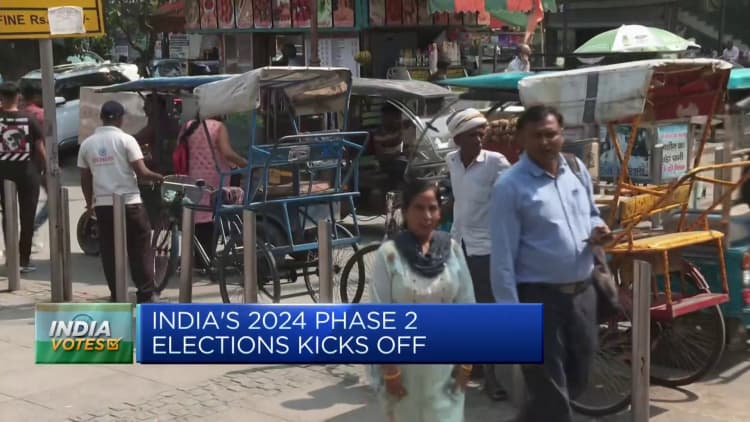[ad_1]
Farmers in India’s Punjab state are elevating the pitch of their ongoing protests, because the second section of India’s basic elections begins April 26, 2024.
Narinder Nanu | Afp | Getty Photos
NEW DELHI — Farmers in India’s Punjab state are elevating the pitch of their ongoing protests, because the second section of India’s basic elections begins Friday.
Hundreds of farmers proceed to drum up help for his or her calls for, foremost being a authorized assure for minimal help costs for his or her produce.
They’ve occupied railway tracks within the northwestern state of Punjab, disrupting operations, with trains on 149 routes both being cancelled, diverted or journeys terminated halfway on Wednesday, as they demand the discharge of farmers taken into police custody.
Whereas the protestors are starting to up the ante, the agitation this time, which started in February, appears a pale shadow of their motion in 2020 when a whole lot of 1000’s of farmers took to the streets in a year-long protest in opposition to three farm legal guidelines.
In a uncommon coverage setback for Prime Minister Narendra Modi, the farm legal guidelines had been revoked in 2021.
This time, nevertheless, fenced in by barricades and below the watchful eyes of the state police and paramilitary forces, protests have been comparatively low-key and largely restricted to Shambhu and Khanauri borders between the states of Punjab and Haryana in northern India.
A few of the distinguished leaders from different states who participated within the earlier protests had been additionally lacking in motion.
The federal government has proven no indicators of capitulation, even because it dangers dropping help from the large farmer inhabitants at a time when Modi is preventing to win a 3rd time period within the nationwide elections.

The Congress and several other opposition events have put farmers’ demand about minimal help costs (MSP) of their manifesto, whereas the ruling Bharatiya Janata Celebration (BJP) has “steadfastly refused to acknowledge this demand, due to this fact it can have some impact [electorally],” mentioned Yogendra Yadav, political activist and a former psephologist.
About 250 million individuals work in agriculture in India, in accordance with authorities knowledge, constituting about 45% of India’s workforce.
Individuals are “very sympathetic” to the farmers’ trigger because of the BJP’s high-handedness in coping with the protestors, in accordance with Sanjay Kumar, co-director of Lokniti, a analysis program on the New Delhi-based Centre for the Research of Creating Societies.
A Lokniti-CSDS survey earlier this month confirmed 59% of the respondents discovered the farmers’ calls for “real,” whereas 16% deemed the protests a “conspiracy” in opposition to the federal government.
The election juggernaut of Modi’s BJP, nevertheless, is unlikely to be materially impacted by the continued agitation. A number of surveys have forecast that the ruling get together’s victory is imminent on this nationwide election.
Farmers shout slogans as they block railway tracks throughout an illustration demanding compensations and jobs for the households of those that died throughout protests in opposition to the central authorities’s agricultural reforms on the outskirts of Amritsar on December 24, 2021.
Narinder Nanu | AFP | Getty Photos
Kumar mentioned the protests had been unlikely to trigger any substantial dent to the BJP’s electoral prospects.
“When farmers go to vote, it is not like they are saying: ‘We’re farmers so we should vote en masse to throw this authorities or help that authorities.’ Usually, they vote on get together strains. Different identities take over,” Kumar mentioned.
The identical survey confirmed 44% of the individuals wished to reelect the federal government, totally on account of its “good work.”
“Folks might need big anxieties, however how does it matter in the event that they find yourself voting for a similar get together. I do not see a significant change within the end result of 2024 elections in contrast with 2019 [when BJP won a second term],” Kumar mentioned.
CNBC didn’t instantly obtain a response from India’s Agriculture Ministry on queries pertaining to the farmers’ calls for.
Stifling dissent?
Farm leaders have alleged that the federal government is attempting to maintain the protests contained to simply Punjab and make it an area concern.
“After we began the protests, the federal government informed us we couldn’t deliver autos, akin to tractors to Delhi, however might come through public transport. Nonetheless, when farmers from different BJP-ruled states tried to come back to Delhi through trains and buses, they had been detained,” claimed farmer chief Jagjit Singh Dallewal, in accordance with a CNBC translation of his assertion in Hindi.
Experiences from native media mentioned dozens of farmers had been detained.
A small of group of farmers from Tamil Nadu held a protest at Jantar Mantar in Delhi on Tuesday and Wednesday in solidarity with their friends from Punjab and Haryana. They mentioned that they had additionally participated in protests on the Shabhu border, the nerve middle of the present demonstrations.
“We are going to now go to Varanasi and 1,000 individuals will file nominations in opposition to Modi,” mentioned P. Ayyakannu, the chief of the farmers from Tamil Nadu. Modi is contesting for a parliamentary seat from town of Varansai within the state of Uttar Pradesh.
Dallewal, the convener of the Samyukta Kisan Morcha (non-political), a coalition on farmers’ unions below which the present protests have been organized, mentioned they are going to proceed to protest, however the calls for weren’t a political concern for them.
“We’re sitting right here as elections are on, so political events need to take discover, and embrace our calls for of their ballot manifestos,” Dallewal informed CNBC.
What India’s farmers need
Indian farmers’ foremost demand is that of assured minimal help costs — the bottom price at which the federal government companies can buy crops from farmers — aimed toward shielding them from wild market fluctuations.
The farmers need MSP for his or her agricultural produce to be decided in accordance with the rules of the Swaminathan Fee on farmers. The Fee, which got here out with 5 stories between 2004 and 2006, recommends MSP at a 50% revenue over their manufacturing prices.
Different key calls for embrace mortgage waivers, pensions for all farmers above the age of 60, a pointy improve in wages — almost two to a few occasions the present charges — in addition to assured employment for 200 days. They’re additionally insisting that India withdraw from the World Commerce Group.
A number of economists have mentioned the farmers’ calls for will not be economically viable.
“These calls for will not be simply detrimental to the agricultural sector, however they are going to throw a significant spanner within the financial system. All the financial system will go right into a tizzy,” economist and a former chairman of the Fee for Agricultural Prices and Costs, Authorities of India, Ashok Gulati mentioned.
Farm leaders who spoke to CNBC, together with Dallewal, mentioned their calls for weren’t new and politicians together with the prime minister have promised a lot of the issues they’re asking for of their previous political campaigns.
Former IMF government director, Surjit Bhalla, additionally a former member of prime minister’s financial advisory council was crucial of the calls for.
“Considered one of today, we are going to all get actual … since 2014, we’ve got taken vital steps towards actuality, however in sure areas, such because the agri sector, farm legal guidelines, we’re nonetheless caught within the 19th century,” he informed CNBC.
Arun Kumar, economist and a former professor at New Delhi-based Jawahar Lal Nehru college, disagreed. He mentioned discuss in regards to the authorities being overburdened due to the farmers’ MSP demand was deceptive.
“The authorized assure for MSP will come into play provided that the value [of commodities] drops under a sure degree. Solely then the federal government might want to purchase,” Kumar informed CNBC. “If the value would not fall under the MSP, the federal government doesn’t have to purchase something. The truth is, 95% of the produce might be offered within the open market.”
— CNBC’s Naman Tandon contributed to this story.
[ad_2]
Supply hyperlink


